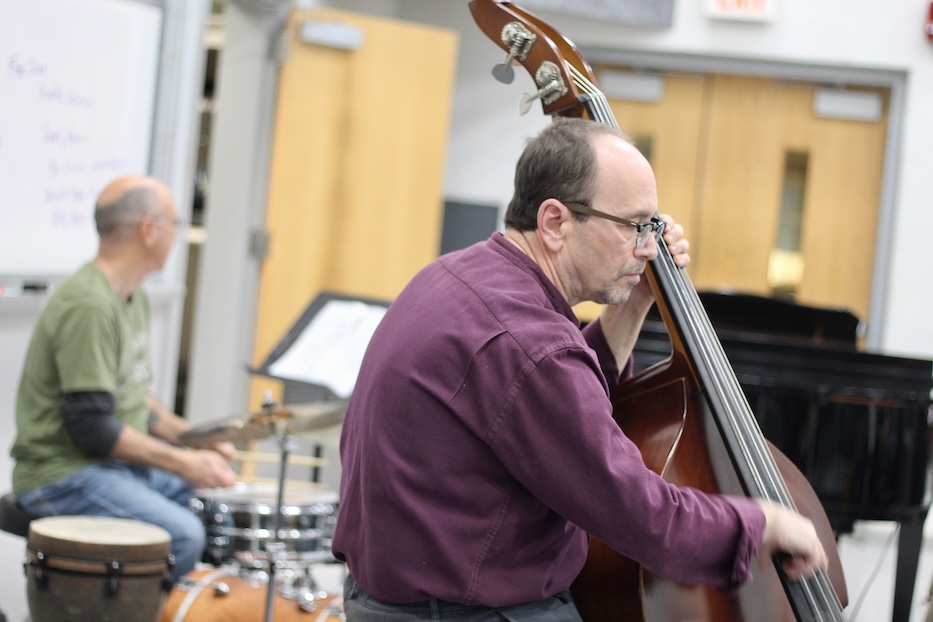
Congregation Mishkan Israel | Culture & Community | Hanukkah | Klezmer | Music | Nu Haven Kapelye | Southern Connecticut State University | Arts & Culture
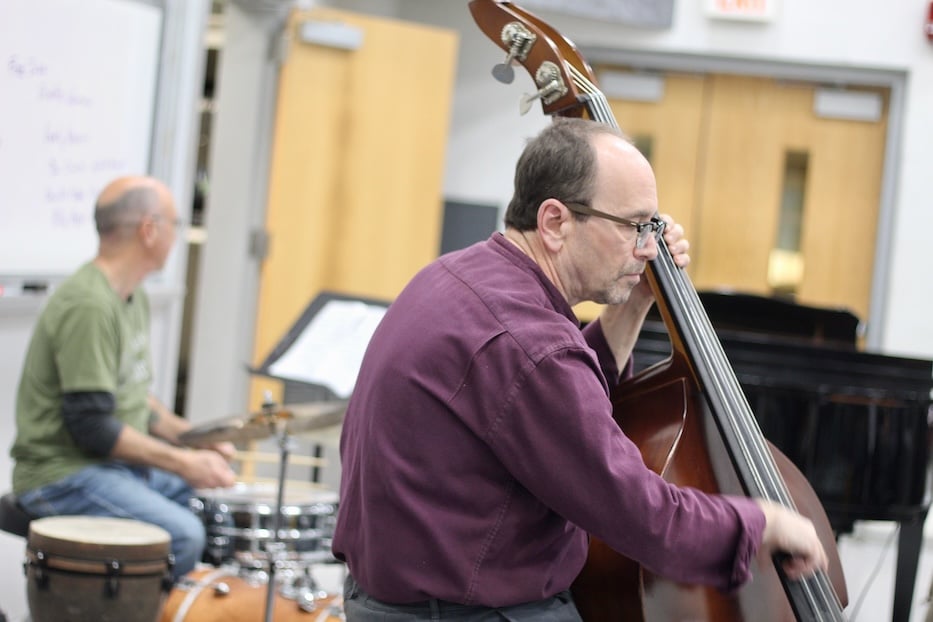
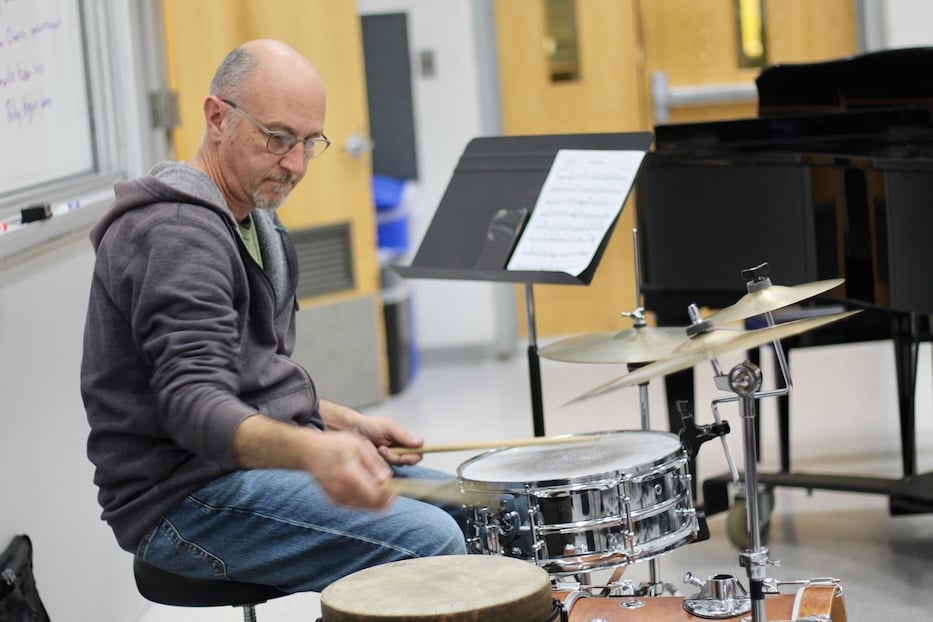
Top: David Chevan. Bottom: Jay Miles.
David Chevan wrapped one arm around the neck of his upright bass, the notes to "Araber Tanz" dancing on a piece of sheet music in front of him. From the left side of the room, a low, crisp rumble came off the drums, musician Jay Miles slipping into a klezmer groove. For a moment, bass and percussion circled each other, two longtime friends at a crossroads. As their voices rose toward the ceiling, woodwinds and strings entered, all keeping the beat.
So unfolded a rehearsal of the Nu Haven Kapelye Tuesday evening, as musicians prepared for their 25th annual December 25 concert at Congregation Mishkan Israel (CMI) in Hamden. Two and a half decades after coming together as a loose collective interested in Jewish music, the group is celebrating its quarter-century birthday with a string of December performances and the release of a new 13-track album, titled Nu Haven Style and available on what much of the world recognizes as Christmas Day.
Members practice at Southern Connecticut State University (SCSU), where music director David Chevan is a professor in the music department.
"Now and always, one of the great refuges that we have in our lives can be music," said Chevan, who has served as the group's musical director since its first concert at CMI in 1998, in a phone call Wednesday morning. "It can be this thing that brings you up when you're down, and it can create this kind of catharsis. There are also all these ways that music works that's completely apolitical, which is really why I believe in the power of music."
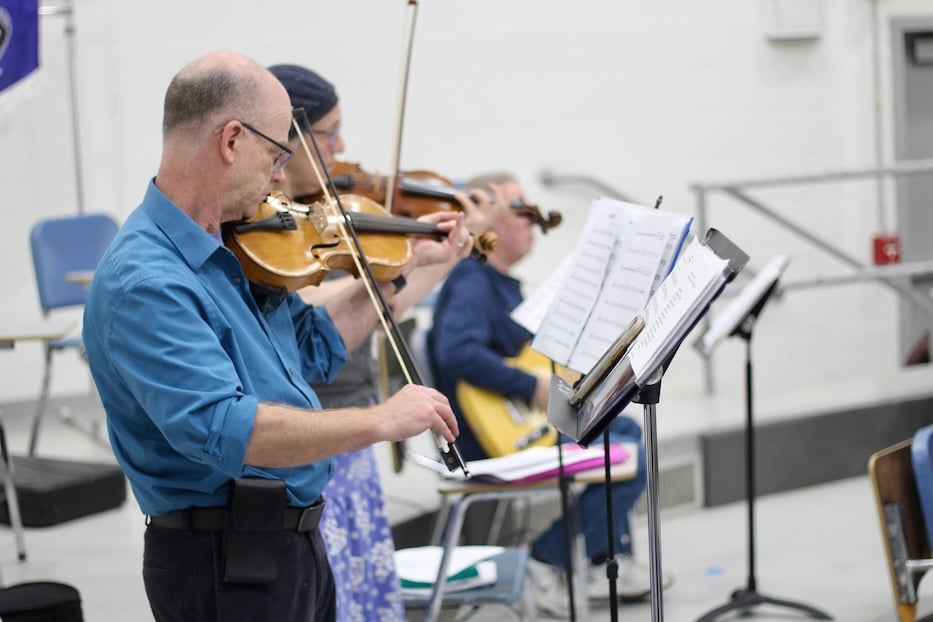
Hugh Blumenfeld and Tova Dreyfus on violin.
The history of the group, into which generations of musicians have now been born and raised, begins in the mid-1990s, long before any formal mention of the Kapelye itself. In 1993, Chevan moved to New Haven to take a job teaching jazz, jazz history and music at SCSU. As he and fellow professors helped build the school's music major, he met a number of New Haven artists who wanted a space "to improvise and make music," he remembered. It gave birth to something called the Creative Music Orchestra, a mix of SCSU affiliates and townies that came together to play on a regular basis.
Through the orchestra, Chevan found himself connected with musicians across New England, with a finger on the pulse of events that popped up around the region (he was by then also a founding member of The Afro-Semitic Experience, which has also led to a web of musical networks). It was there that he first read about a concert that a klezmer group was performing on December 25. The idea resonated with him immediately.
He looped in members of the Creative Music Orchestra, put together a set list that included a few Jewish folk tunes and Hanukkah songs, and got to work rehearsing.
"I was coming at it from this perspective that you should put your own spin on things," he said. Congregation Mishkan Israel, where Chevan, his wife Julie and two young sons were already members, jumped at the idea and opened its doors to the group. A handful of musicians, mostly members of the Creative Music Orchestra and a few from CMI, signed on to play. Never, Chevan said, did he envision that he was creating a tradition that would last at least a quarter of a century.
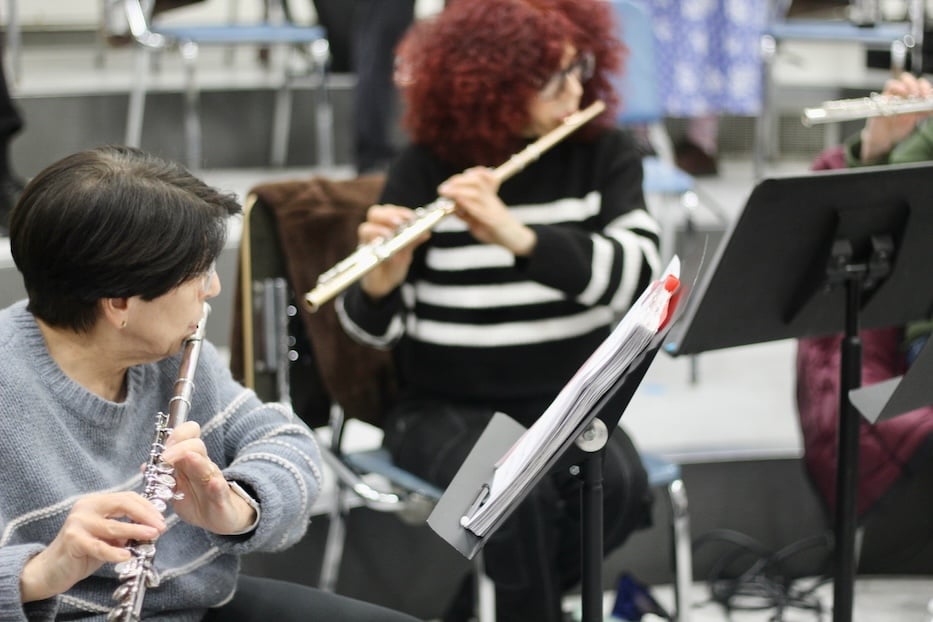
Hedda Rubenstein, who does flute and vocals.
"The first year, it was really hard," he remembered. Some of the musicians were steeped in the tradition of Jewish music, and others had never played it before. The idea of forming a collective specifically around klezmer was still a few years away; Chevan remained deferential to another klezmer group in the state that included nationally-recognized musicians Cookie Segelstein and Adrianne Greenbaum. "I was really just looking at this as an opportunity for learning and trying something new."
And yet, musicians returned for another concert the following year, and another the following, and another the year after that, too. Audiences came out for the show, excited to buck the tradition of Chinese food and a movie for live entertainment. By the early 2000s, several new members had joined the group, filling the synagogue with joyful sound each December. Chevan, who did all of the arrangements and organized musicians each year, started getting requests from community members who wanted Jewish music at their events. He realized that the group might be onto something.
He wasn't the only one. Dalton King, a longtime member of both CMI and the Creative Music Orchestra, played the concert that first year and found that the group kept him coming back. It wasn't just that it gave him a chance to play the saxophone, which he started in grade school, or experiment with the klezmer tradition for the first time. It was that it gave him a sense of rootedness, tradition and community when he least expected to find it.
"It's bringing people together on a day when you're feeling rather separated from the rest of the world," he said, praising Chevan's leadership and openness to klezmer, jazz, and new arrangements of Jewish music. "It just meshed really nicely with what I wanted to do."
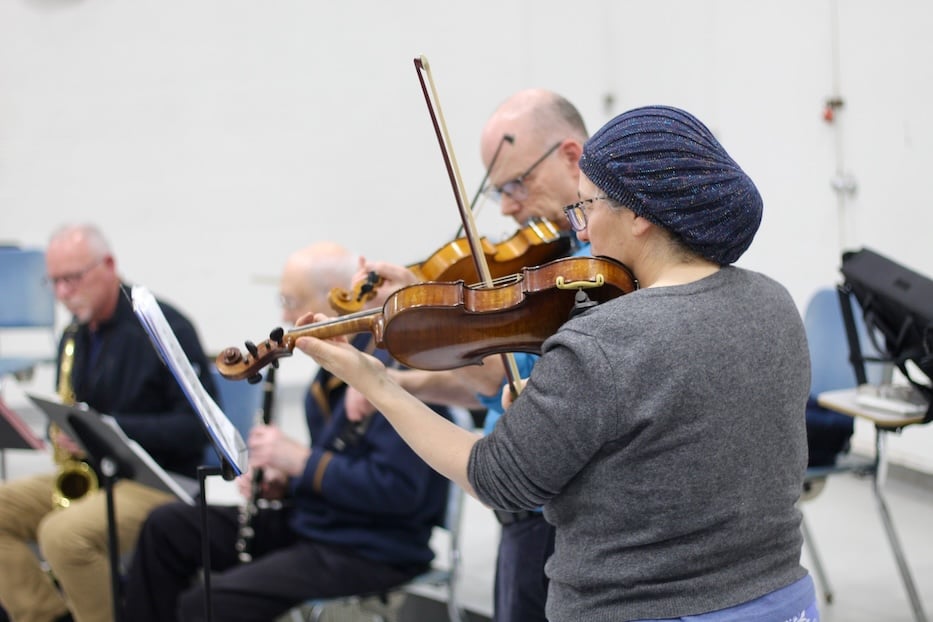
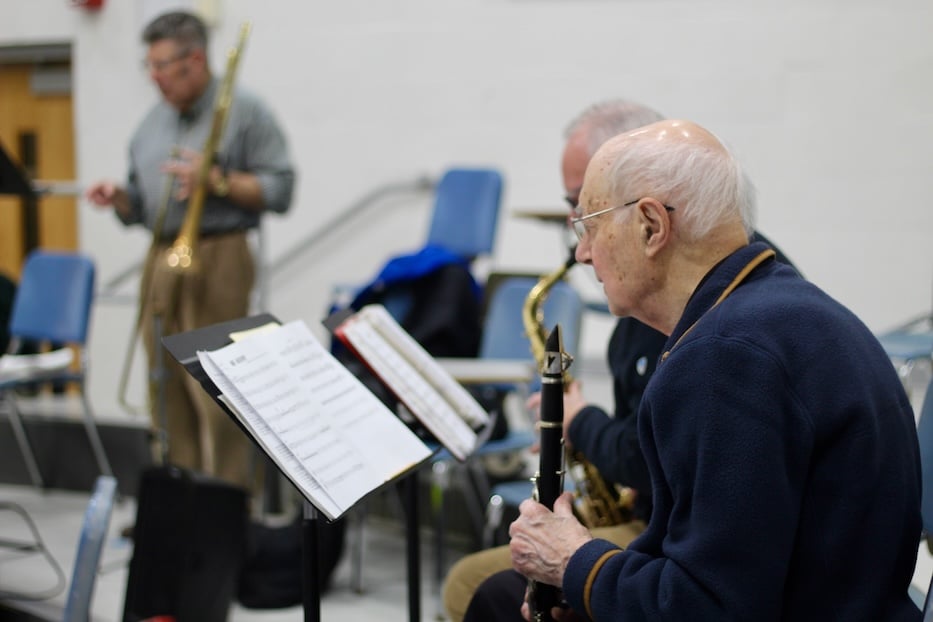
Jim Serling on clarinet.
By its 10th birthday, the group had grown into a rotating door of musicians and instruments, where a show might include as few as six or as many as two dozen people. As he built a repertoire, Chevan and members dove deeper into the klezmer tradition, through which some of them connected to their musical roots. Jim Serling, a clarinet player who joined around 2003, remembered the thrill of deepening his own relationship with Judaism through music.
He joined the group after a stint at KlezKamp taught him how little he knew about Yiddish culture. Despite grandparents who came from Hungary and modern-day Ukraine, "I realized I really didn't know a lot," he said. Then someone told him that there was an annual event dedicated to music and Yiddishkeit at Congregation Mishkan Israel, where he and his wife were members. The rest was history.
"I enjoy the people," he said when asked what keeps him coming back to the group. “I enjoy the music, and I learn a lot.” Tuesday, a listener could hear that enthusiasm as he eased into the swing of "Turetskaya," the woodwind swooping in with a slow, gentle descent that felt like a bird soaring over the rest of the song. "It's about the opportunity to play for people."
With Chevan at the helm, the Kapelye has kept experimenting with both new work and traditional repertoire, often presenting itself as the klezmer big band New England didn't know it needed. In 2016, the group released its first album, What's Nu?, and worked toward becoming a formal nonprofit organization, which it ultimately did in 2019. By its 20th year, it totaled over three dozen members, including children who grew up playing with their parents, and cycled in and out of the Kapelye when they graduated high school, returned from college, and built lives and families of their own.
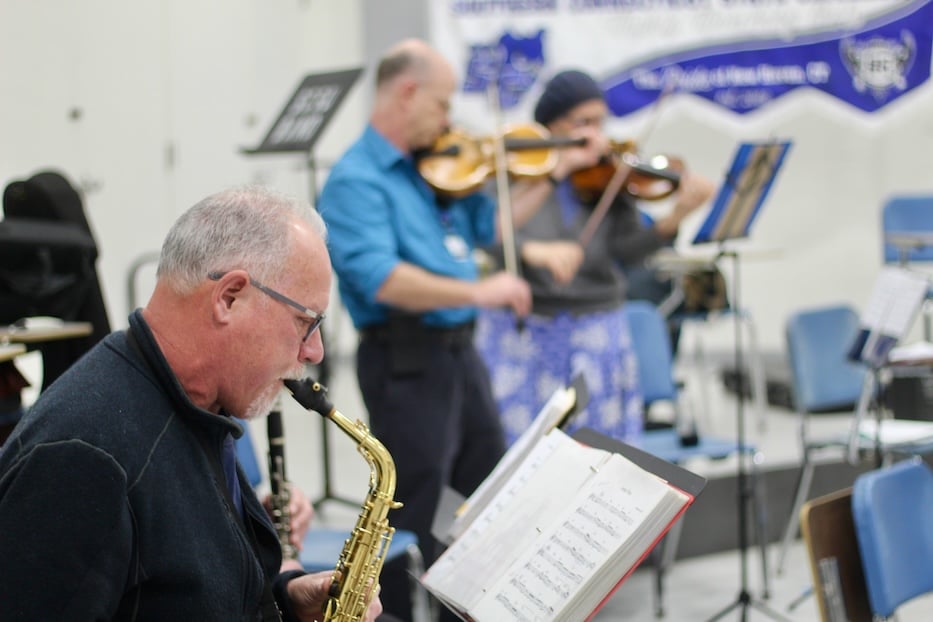
King: "It's bringing people together on a day when you're feeling rather separated from the rest of the world."
"Everyone has these amazing stories about how the Kapelye connects them with people," Chevan said. "If you look at the personnel for the album, there are lots of parents and kids who have played together. It speaks to me about human connection."
That's part of the goal, he and others added at Tuesday night's rehearsal. Twenty-five years in, the Kapelye keeps surprising its audiences and its members with new work, and also pulls out traditional favorites that listeners have come to love. Jonathan Zabin, who attended the first December 25 concert and joined in time for the second, praised the group as one that keeps him on his musical toes, with an approach that allows its members to grow their skill sets with real time experience.
While he had sung Jewish music for decades before the Kapelye, the group "was so different from anything I'd ever done before," he said. "It really expanded my musical knowledge."
For many of its members, it's also become a sort of kleztastic home to generations of musicians who can (and do) learn from each other constantly. Flautist Anna Reisman, who joined in 2009 and later became the group's first board president, said that it's both Chevan's leadership and the singularity of klezmer music that keeps her coming to the group as frequently as possible. After decades playing the flute, including with the Yale Medical Symphony Orchestra, the Kapelye has offered her something completely different.
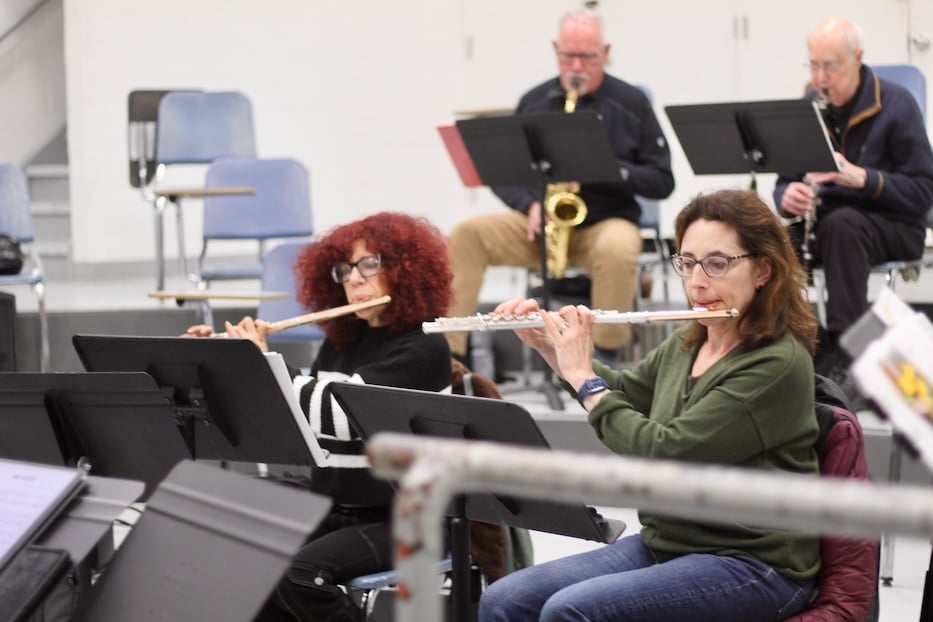
Meri Harary and Anna Reisman on flute.
"I've always loved this kind of music, but I didn't know that much about it," she said. Since joining, she's been especially drawn to "the freedom to experiment," from a trill that she might add to the end of a measure to a new number where she gets a few bars to improvise. Now, when Chevan offers up an opportunity to play—whether it’s at the Towers or at the farmer’s market—she's one of the first people to raise her hand and volunteer to do it.
"I love it!" she said. "I love the music, I love the people. It's just a side of me that is very freeing. It's a nice community and we're all connected by music."
That spirit resonates for members like Zabin, who have stayed on faithfully since the late 1990s. After watching from the audience in 1998—with a laugh, he remembered feeling miffed that no one had invited him into the group— Zabin jumped into the Kapelye, and never left. In the early 2000s, his young son Eli stepped onto the stage with his dad for the first time, strumming a toy guitar as Zabin played the real thing. This year, he plans to return for a duet.
The group is constantly trying out new music, said Chevan, which is part of the fun. At a rehearsal Tuesday night in SCSU's Earl Hall, a perfect minyan of musicians flexed some of those muscles, excited to grow the scope of their repertoire with three weeks left until the concert (the group will perform a number of Hanukkah gigs this month, including one Thursday at Gateway Community College and another next Thursday at Best Video Film & Cultural Center in Hamden). At the front of the room, Chevan ushered in the second piece of the night, marrying "Gershfeld's Freylekhs" with "Turetskaya."
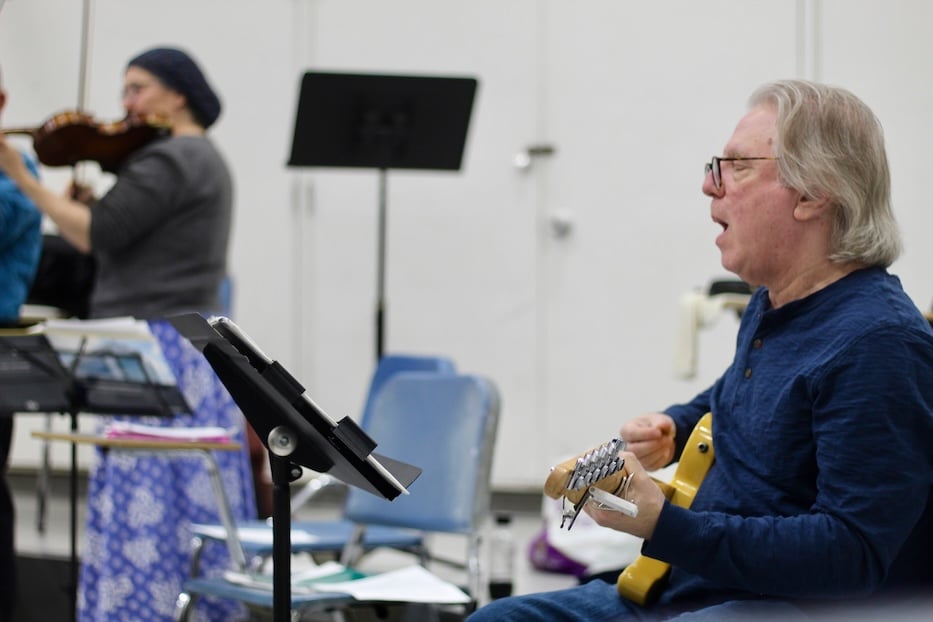
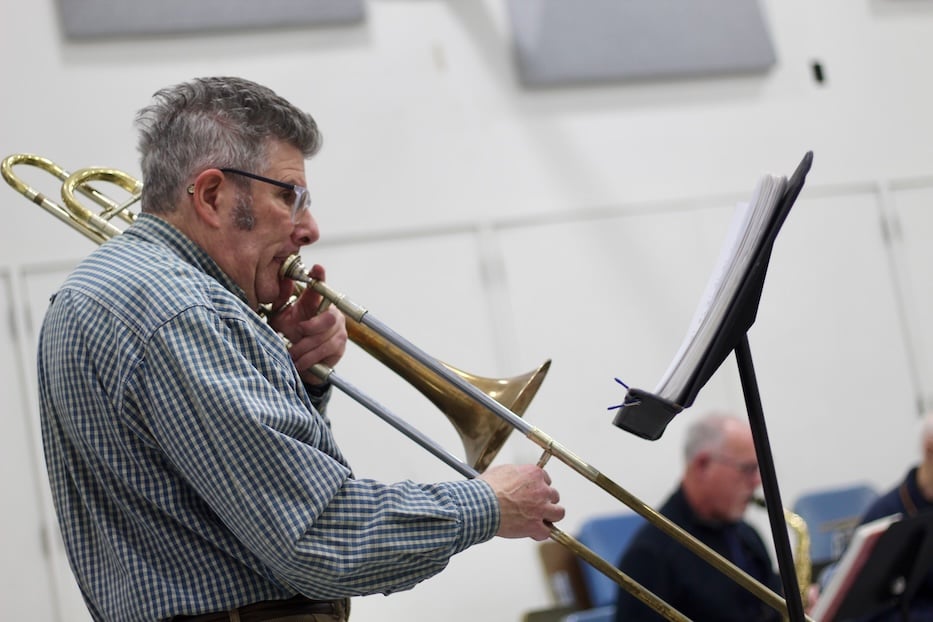
Zabin on guitar and Isaiah Cooper on trombone.
"Here we go! On three!" he yelled. As the mashup began, strings rose in the back of the room, where Hugh Blumenfeld and Tova Dreyfus stood with their violins placed gently between their shoulders and chins. Within moments, flutes swooped in, then broke away from the sound just as quickly. From the row where three flutists sat, a trill sailed up over the mix.
Then just as quickly, the temp shifted. The group was time-traveling back to Bucharest, instruments chasing each other as they lent a danceable melody to "Turetskaya." At the front of the room, Chevan joined in on the bass, half-conducting even as he played. As the familiar sound filled the space, he sank into it, seemingly at home in the notes.
It laid the groundwork for what he called a few "incredibly ambitious" combinations that he's excited to try out before the show and album release party later this month. For the past several weeks, he's been working with Greenbaum to strike the right tone between musicality and danceability, with new combinations that push musicians and also show the level of work of which they're capable.
"Rehearsals are like going into the chem lab," he said (King, who worked for years as a chemist at Bristol Myers Squibb, smiled gently from the other end of the room). "I know the ingredients and I think we can find the combination we're looking for."
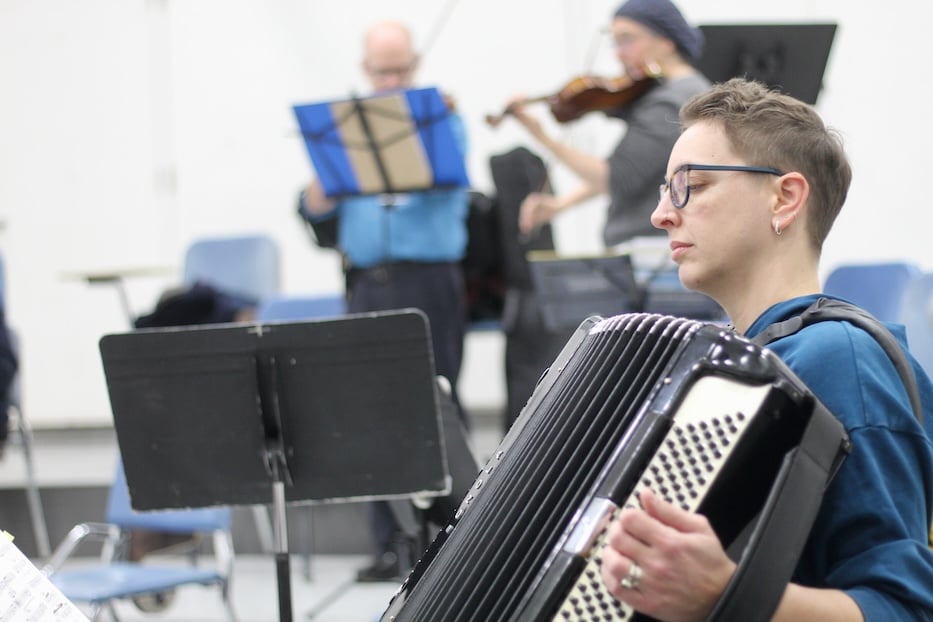
Dana Astmann on accordion.
In one arrangement, for instance, he has yoked together the "Bessarabian Hora," "Slivovitz," "Sadegurer Khosidl," and "Uncle Max's Bulgar," turning a three-minute hora into an old world musical odyssey that runs close to 10 minutes, and shape shifts through tempos and melodies enough times to keep a listener on their toes. In another, he's married "Ot Azoi" and "Mah Yofus"—both Kapelye favorites—with "Nakht in Gan Eyden" and "Kostakowsky Bulgar."
Several of the arrangements, he said, are meant to both push musicians and encourage dancing among members of the audience. After all, "what is the worst that could possibly happen?" he said with a mischievous smile.
In fact, there's a great deal of good that seems to be coming out of it, often with few or no words at all. Within the Kapelye, no two opinions on the state of American Jewry or Israel and Palestine or even the meaning of December 25 are exactly the same (Miles noted that some members come from mixed households, meaning they celebrate Christmas in the morning, then scurry over to CMI to play in the afternoon). When they sit down to play, it's a universal language that they're speaking to each other, and the audience.
"It's not just about being an American Jew, I'm also a human," Chevan said, reflecting on a year he spent in Jerusalem with his family when he was 12, and the country was on the brink of the Yom Kippur War. "You don't know the regular stuff that's happening in a person's life all the time. You do the concert for a lot of reasons."

